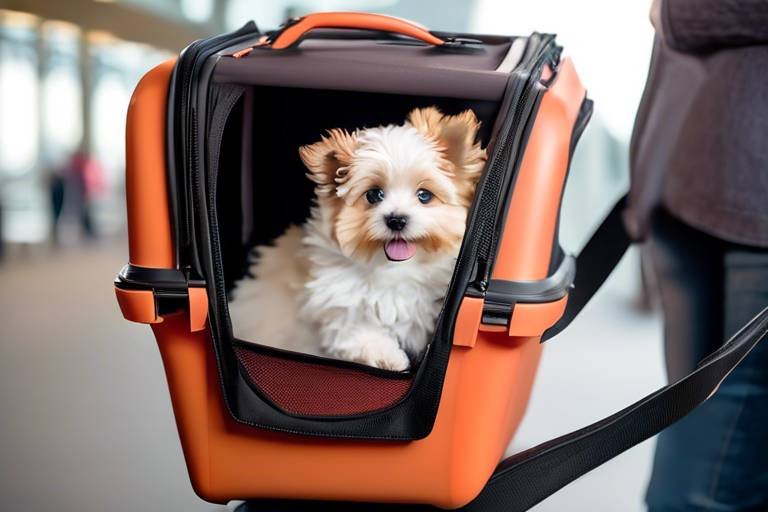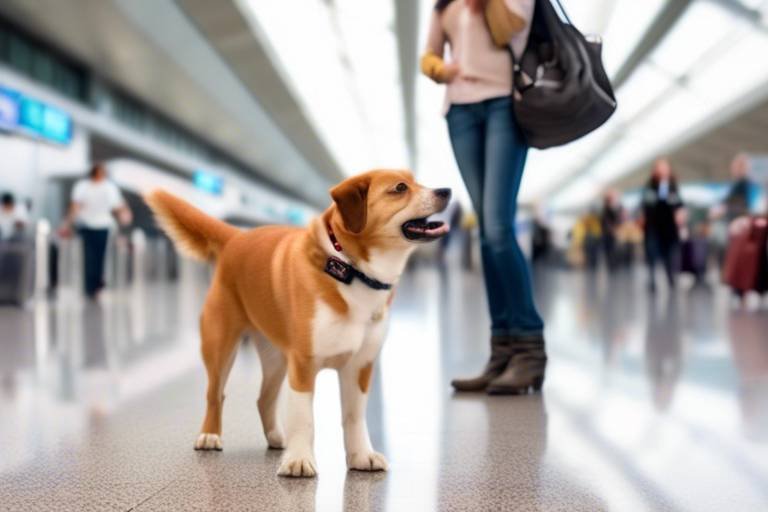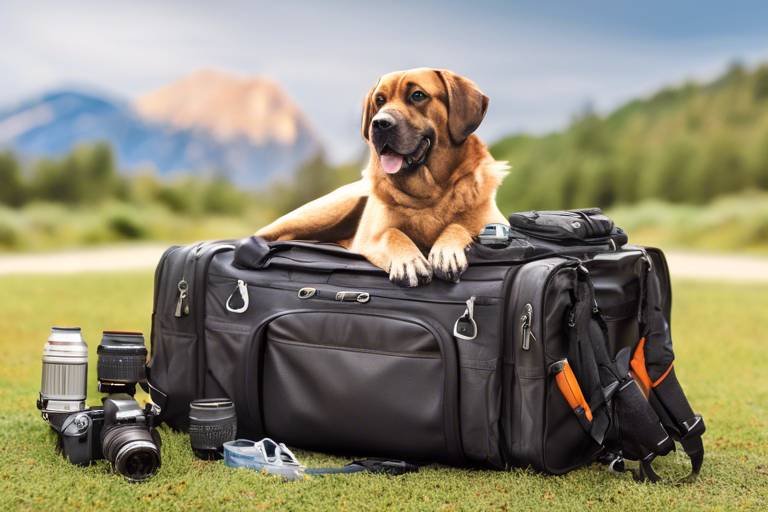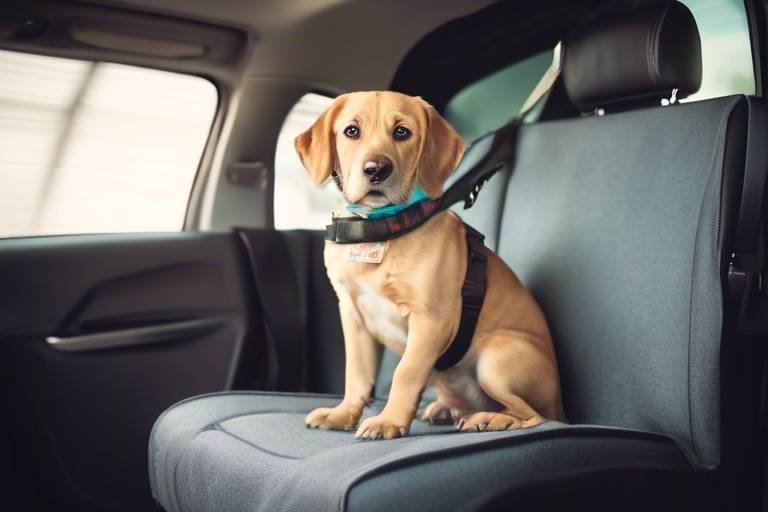Traveling with Pets - A Guide to Pet Passports
Traveling with our furry friends can be one of the most rewarding experiences, but it also comes with its own set of challenges. One of the most crucial aspects of planning a trip with your pet is understanding the concept of a pet passport. This document is not just a fancy piece of paper; it's a vital tool that can make international travel with your beloved companion much smoother. Imagine this: you're at the airport, your pet is excitedly wagging its tail, and you have all the necessary documentation ready to go. That’s the power of a pet passport! It contains essential information about your pet's health and identity, which can help you avoid potential hiccups at borders and ensure a hassle-free journey.
So, what exactly is a pet passport? In simple terms, it's a comprehensive document that includes your pet's vaccination history, microchip details, and health certificates. Think of it as your pet's travel ID, proving that they are healthy and fit to travel. Just like we need our passports to cross borders, our pets require theirs too. The significance of having a pet passport cannot be overstated; it not only keeps your pet safe but also gives you peace of mind while you explore new places together.
In this guide, we'll delve deeper into the requirements for obtaining a pet passport, including the necessary vaccinations, microchipping, and health certificates. We'll also share some handy tips for traveling with your pets, ensuring that both you and your furry companions have an enjoyable experience. Whether you're planning a quick getaway or a long-term relocation, understanding the ins and outs of pet passports is essential for a smooth journey.
A pet passport is more than just a travel document; it is a gateway to adventure for you and your pet. It typically includes the following information:
- Identification details: Your pet's name, breed, age, and microchip number.
- Vaccination records: Proof of vaccinations, particularly for rabies, which is a common requirement.
- Health certificates: Documentation from a veterinarian confirming your pet is fit for travel.
Having all this information in one place not only simplifies the travel process but also helps ensure your pet's well-being. Without a pet passport, you may face delays, fines, or even the possibility of being turned away at the border. So, before you pack your bags, make sure your furry friend has their passport in order!
Now that we've established the importance of a pet passport, let's dive into the requirements for obtaining one. The prerequisites can vary significantly from country to country, but there are some common elements that most pet owners will encounter. Generally, you will need:
- Vaccinations: Most countries require pets to be vaccinated against rabies and possibly other diseases.
- Microchipping: A microchip is often mandatory for identification purposes.
- Health certificates: A document from a licensed veterinarian stating that your pet is healthy and fit for travel.
It's essential to check the specific regulations of the country you are visiting to ensure you meet all requirements. This can save you a lot of stress and heartache down the line, as some countries have strict entry rules regarding pets.
Vaccination is a crucial component of obtaining a pet passport. Most countries require proof of rabies vaccination, typically administered at least 21 days before travel. Some countries may also have additional vaccination requirements, depending on the local prevalence of certain diseases. For instance, if you're traveling to certain parts of Europe, your pet may need vaccinations for diseases like leptospirosis or distemper. It's always a good idea to consult your veterinarian well in advance of your trip to ensure your pet is up-to-date on all required vaccinations.
Understanding the timing of vaccinations is essential for compliance. You don't want to be scrambling at the last minute, trying to get your pet vaccinated just days before your flight. Ideally, vaccinations should be given at least a month in advance. This not only ensures that your pet's immunity is fully developed but also gives you time to obtain the necessary documentation. Remember, some countries may not allow entry if the vaccination was administered too close to the travel date.
A health certificate issued by a veterinarian is often required for international travel. This document should include details about your pet's vaccination history, microchip number, and a statement confirming that your pet is in good health. It's crucial to obtain this certificate shortly before your departure, as some countries have strict validity periods for health certificates—typically ranging from 7 to 30 days. Be sure to ask your vet for guidance on when to get this done to avoid any last-minute surprises!
Microchipping is often a requirement for international travel. This small chip, implanted under your pet's skin, serves as a permanent form of identification. If your pet gets lost during your travels, a microchip can significantly increase the chances of being reunited. It's like giving your pet a tiny insurance policy! Just make sure that your contact information is up to date in the microchip registry. If you’ve recently moved or changed phone numbers, don’t forget to update those details!
Traveling can be stressful for pets, but with the right preparation, you can make the journey smoother. Here are some practical tips to ensure both you and your furry friend have a comfortable experience:
Preparation is key to a successful trip. Start by acclimating your pet to travel. This can include familiarizing them with their carrier or crate, making it a cozy and inviting space. Practice short trips to help them get used to being in a vehicle or airplane. Just like humans, pets can experience anxiety when faced with new environments, so gradual exposure can make a world of difference.
Packing the right items is essential for your pet's comfort. Here’s a quick checklist of must-have items:
- Food and water bowls
- Enough food for the trip
- Favorite toys or blankets for comfort
- Health supplies, including any medications
By having these essentials on hand, you can ensure that your pet remains calm and happy throughout your journey.
Q: How long does it take to get a pet passport?
A: The time it takes to obtain a pet passport varies depending on the requirements of your destination country and how quickly you can gather the necessary documents. Start the process well in advance of your trip.
Q: Can I travel with my pet without a passport?
A: It is highly discouraged to travel internationally without a pet passport, as many countries require specific documentation for pets. Not having a passport can lead to delays or your pet being denied entry.
Q: What should I do if my pet gets sick while traveling?
A: If your pet shows signs of illness during your travels, consult a veterinarian as soon as possible. Make sure to have a list of local veterinarians at your destination just in case!
In conclusion, traveling with pets can be an incredible adventure, but it requires careful planning and preparation. By understanding the significance of a pet passport and following the necessary steps to obtain one, you can ensure a smooth journey for both you and your furry companions. Happy travels!

Understanding Pet Passports
A pet passport is not just a fancy piece of paper; it's your furry friend's ticket to the world! Imagine planning a dream vacation and realizing you can’t take your beloved pet along because of complicated regulations. That's where pet passports come into play. This essential document facilitates easier international travel for pets by providing crucial health and identification information.
Typically, a pet passport includes several key components:
- Pet Identification: This includes your pet's name, breed, age, and a unique identification number.
- Vaccination Records: Proof of essential vaccinations, especially rabies, is often required.
- Microchip Information: Details about your pet's microchip, including the number and the microchip company.
- Health Certificates: Documentation from a veterinarian confirming your pet is fit for travel.
The significance of a pet passport cannot be overstated. It not only ensures that your pet meets the health requirements of the destination country but also provides peace of mind. Imagine arriving at your destination and knowing that you’ve got all the necessary paperwork in hand; it’s like having a safety net. Moreover, having a pet passport can help expedite the customs process, allowing you to get to your vacation spot faster and with less hassle.
Different countries have varying regulations regarding pet travel, and a pet passport can help you navigate these rules. For example, some countries may require additional vaccinations or specific health checks before allowing your pet to enter. By having a pet passport, you can ensure that you are fully compliant with these requirements, thus avoiding any potential travel hiccups.
In summary, understanding the importance of a pet passport is the first step in ensuring a smooth travel experience for both you and your pet. It’s not just about meeting regulations; it’s about making sure your furry companion is safe, healthy, and ready to explore the world right alongside you!

Requirements for Obtaining a Pet Passport
When it comes to traveling internationally with your furry friend, obtaining a pet passport is a crucial step that cannot be overlooked. Each country has its own set of rules and regulations regarding pet travel, making it essential to familiarize yourself with the specific requirements before you embark on your journey. The main prerequisites for securing a pet passport typically include a combination of vaccinations, microchipping, and a valid health certificate. Let's break these down to understand what you need to do.
First and foremost, vaccinations are a non-negotiable part of the process. Most countries require pets to be up-to-date on certain vaccines, with rabies being the most common. It's not just about protecting your pet; it's also about ensuring the health and safety of other animals and humans in the destination country. Some countries may have additional vaccination requirements based on the region or specific diseases that are prevalent there. Therefore, it's wise to check the official guidelines of your destination well in advance.
Next up is microchipping. This little chip is a game changer when it comes to pet identification. Many countries require pets to be microchipped before they can enter, and it serves as a permanent form of ID. If your pet gets lost while you're traveling, a microchip can be the key to reuniting you with your furry companion. To ensure compliance, make sure the microchip is implanted before the rabies vaccination, as the chip's number will need to be included in the health documentation.
Now, let’s talk about health certificates. This is a document you’ll need from a licensed veterinarian that confirms your pet is healthy and fit for travel. The health certificate should include details such as your pet's vaccination history, microchip information, and a general health assessment. It's typically valid for a limited time, often around 10 days, so timing is crucial. You wouldn't want to be caught in a situation where your pet's health certificate has expired right before your flight!
In summary, the requirements for obtaining a pet passport can vary significantly depending on your destination. Generally, you should ensure that:
- Your pet is up-to-date on required vaccinations.
- Your pet is microchipped with current information.
- You have a valid health certificate from a veterinarian.
It’s always best to start this process early, as gathering all the necessary documents and making sure your pet meets all health requirements can take time. By planning ahead, you can avoid any last-minute surprises and ensure a smooth journey for both you and your beloved pet.
Q: How long does it take to get a pet passport?
A: The time it takes can vary depending on your location and the specific requirements of your destination country. It’s best to start the process at least a few months before your planned travel date.
Q: Can I travel without a pet passport?
A: In most cases, yes, you need a pet passport or equivalent documentation to travel internationally with your pet. Always check the specific requirements of the country you are visiting.
Q: What should I do if my pet has health issues?
A: Consult your veterinarian to discuss your pet's health status and any potential travel restrictions. They can guide you on how to proceed and what documentation you may need.
Vaccination Regulations
When it comes to traveling internationally with your furry friend, understanding is crucial. These regulations are not just bureaucratic hurdles; they are essential for ensuring the health and safety of your pet and other animals. Most countries require pets to be vaccinated against certain diseases, with rabies being the most common. This is because rabies is a deadly virus that can be transmitted to humans, and countries aim to protect their populations by preventing its spread.
Each country has its own specific vaccination requirements, so it’s vital to do your homework before you embark on your journey. For instance, while some countries might only require a rabies vaccination, others may have additional requirements such as vaccinations for distemper, hepatitis, and parvovirus. To make things easier, here’s a quick overview of what you might encounter:
| Country | Required Vaccinations |
|---|---|
| United States | Rabies (usually administered at least 30 days before travel) |
| United Kingdom | Rabies, Distemper, Hepatitis, Parvovirus |
| Australia | Rabies (plus a health certificate) |
It’s not just about getting the vaccinations; it’s also about timing. Most countries require that vaccinations be administered within a specific time frame before travel. For example, rabies vaccinations must often be given at least 21 days before your pet enters the country. This is to ensure that the vaccine has had enough time to take effect and provide the necessary immunity.
In addition to these regulations, you may also need to provide proof of vaccination. This typically comes in the form of a vaccination certificate issued by a licensed veterinarian. This document should include details such as the type of vaccine, the date it was administered, and the veterinarian’s signature. Always keep a copy of this certificate with you while traveling, as you might be asked to present it at borders or during check-ins.
Remember, staying informed and prepared is the best way to ensure a smooth journey for both you and your pet. After all, you wouldn’t want to be turned away at customs due to a missing vaccination record, would you?
- What vaccinations are required for my pet to travel?
The requirements vary by country, but rabies is almost universally required. Check the specific regulations of your destination.
- How long before travel should vaccinations be administered?
Most vaccinations should be given at least 21 days prior to travel, especially rabies.
- Do I need a vaccination certificate?
Yes, a vaccination certificate is typically required to prove that your pet has received the necessary vaccinations.
Timing of Vaccinations
When planning to travel internationally with your furry friend, understanding the is crucial. Many countries have specific regulations regarding how soon before travel your pet needs to be vaccinated. For instance, the rabies vaccine is often a primary requirement, and it’s essential to administer this vaccine at least 21 days prior to your departure date. This waiting period ensures that your pet has developed sufficient immunity to the disease, which is critical for both their safety and compliance with international travel regulations.
Additionally, some countries may require that vaccinations be administered within a certain timeframe before travel, typically within the last 12 months. This means that if your pet's vaccinations are nearing expiration, you'll need to schedule a booster shot well in advance of your travel date. It’s not just about getting the shots; it’s about timing them right!
Here’s a quick overview of vaccination timing:
| Vaccine | Timing Requirement |
|---|---|
| Rabies | At least 21 days before travel |
| Other Vaccines (e.g., Distemper, Hepatitis) | Administered within the last 12 months |
Moreover, it’s advisable to consult your veterinarian for a personalized vaccination schedule based on your pet’s health status and the destination country’s specific requirements. They can also provide you with a comprehensive health record, which may be necessary for border control. Remember, planning ahead can save you from last-minute hassles and ensure your pet enjoys a safe and healthy journey!
In conclusion, the timing of vaccinations is not just a formality; it’s a fundamental aspect of ensuring your pet’s well-being during travel. By adhering to the vaccination timeline, you’ll not only comply with legal requirements but also provide your pet with the best possible protection against diseases they might encounter in a new environment.
Health Certificates
When it comes to traveling with your furry friend, a health certificate is often a crucial piece of documentation you'll need to secure. This certificate, typically issued by a licensed veterinarian, serves as proof that your pet is healthy and fit for travel. But what exactly does it entail? Well, let’s break it down.
A health certificate generally includes important information such as your pet's identification details, vaccination history, and a statement from the veterinarian confirming that your pet is free from any contagious diseases. The certificate usually needs to be issued within a specific time frame before travel—often within 10 days—so it’s essential to plan ahead. This ensures that your pet meets the entry requirements of your destination country.
Here are some key components that should be present in a health certificate:
- Pet's Identification: This includes your pet's name, breed, age, and microchip number if applicable.
- Vaccination Records: Proof of current vaccinations, particularly for rabies, must be documented.
- Veterinarian's Statement: A declaration that your pet is healthy and free from any infectious diseases.
- Validity Period: The certificate should specify how long it remains valid for travel.
Obtaining a health certificate is not just a formality; it’s a way to ensure the safety and health of your pet during travel. Different countries may have varying requirements, so it’s vital to check the specific regulations of your destination well in advance. This helps avoid any last-minute hiccups that could derail your travel plans.
Additionally, keep in mind that some airlines and transportation services have their own regulations regarding health certificates, so it's wise to confirm these details before your trip. Having all the necessary documentation ready can make the difference between a smooth journey and a stressful one.
In summary, securing a health certificate is a critical step in the travel process for your pet. It not only provides peace of mind but also ensures compliance with international travel regulations. So, before you embark on your adventure, make sure to check this off your list!
Here are some common queries pet owners have regarding health certificates:
- How long is a health certificate valid? Generally, a health certificate is valid for 10 days from the date it is issued, but this can vary by country.
- Can I get a health certificate from any veterinarian? Yes, but make sure the veterinarian is accredited and familiar with travel health certificates.
- What if my pet has a pre-existing condition? Discuss your pet's condition with your veterinarian to determine if travel is advisable and what documentation may be needed.
Microchipping Your Pet
Microchipping your pet is not just a trend; it's a lifesaver. Imagine this: you and your furry friend are exploring a new city, and suddenly, they dart off, chasing after a squirrel or a butterfly. Panic sets in as you call their name, but they’re nowhere to be found. This is where microchipping comes into play. A microchip is a tiny device, about the size of a grain of rice, that is implanted just under your pet's skin. It contains a unique identification number linked to your contact information, which can be accessed by scanning the chip.
But why is microchipping so important, especially when traveling internationally? First and foremost, many countries require pets to be microchipped as part of their entry regulations. This is to ensure that lost pets can be quickly identified and reunited with their owners. Without a microchip, your pet may be sent to quarantine or, worse, could end up in a shelter without a way to return home. So, if you’re planning a trip abroad, getting your pet microchipped should be at the top of your to-do list.
The process of microchipping is relatively simple and quick. It can be done at your veterinarian's office or at some animal shelters. The veterinarian will use a special needle to insert the microchip, which is a quick procedure that usually doesn’t require anesthesia. After the procedure, it’s essential to register the chip with your contact details in a microchip registry. This way, if your pet gets lost, anyone who finds them can scan the chip and contact you.
Here are a few key points to consider when microchipping your pet:
- Update Your Information: Always ensure that your contact information is current in the microchip registry. If you move or change your phone number, update it immediately.
- Check the Chip: Ask your vet to scan your pet's microchip during regular check-ups to ensure it’s functioning correctly.
- Consider Additional Identification: While microchips are effective, they should be used in conjunction with other forms of identification, such as a collar with an ID tag.
In conclusion, microchipping your pet is a small step that can make a huge difference in ensuring their safety and your peace of mind while traveling. It’s a simple, quick procedure that can save you from the heartache of losing your beloved companion. So before you embark on your next adventure, make sure your pet is microchipped and ready to explore the world with you!
1. Is microchipping painful for my pet?
Most pets experience only minimal discomfort during the microchipping process, similar to receiving a vaccination. The procedure is quick, and any discomfort is usually brief.
2. Can I microchip my pet at home?
No, microchipping must be done by a qualified professional, such as a veterinarian. They have the necessary tools and training to ensure the chip is implanted properly.
3. How often should I check my pet's microchip?
It's a good idea to have your pet's microchip scanned during regular veterinary check-ups to ensure it is functioning correctly and that your information is up to date.
4. What should I do if my pet goes missing?
If your pet goes missing, immediately contact local shelters and veterinary clinics. Provide them with your pet's microchip number so they can help in the search.

Traveling Tips for Pets
Traveling with your furry friends can be an adventure filled with joy, but it also comes with its fair share of challenges. To make the journey smoother for both you and your pet, it’s essential to be well-prepared. Think of it like planning a family road trip; the better your preparation, the more fun you’ll have! Start by familiarizing your pet with the travel environment. This means letting them explore their carrier or crate well before the big day. It’s all about making them feel at ease, just like how you would want to feel comfortable in a new place.
One of the first things you should do is prepare your pet for travel. Acclimate them to the carrier by allowing them to spend time in it at home. You can even make it a cozy spot by adding their favorite blanket or toy. If possible, take them on short car rides to help them get used to the motion and sounds of travel. This not only reduces anxiety but also helps them associate the carrier with positive experiences.
When it comes to packing, don’t forget the essentials! Just like you wouldn’t go on a trip without your toothbrush, your pet needs their own travel kit. Essentials include:
- Food and Water: Bring enough of their regular food to last the trip, along with a portable water bowl.
- Health Supplies: Always pack any medications, a first-aid kit, and a copy of their health records.
- Comfort Items: Familiar toys or blankets can help soothe your pet during the journey.
Additionally, consider your pet's comfort during the trip. If you’re traveling by car, make frequent stops to let them stretch their legs and relieve themselves. If flying, check with the airline for their specific pet policies and make sure your pet is comfortable in their carrier. You wouldn’t want to be cramped in a small space for hours, right? The same goes for your pet!
Lastly, keep in mind that some pets may experience anxiety during travel. To help alleviate their stress, you might want to consult your veterinarian about calming aids or natural remedies. Just like humans, pets can feel nervous in new environments, and a little extra care can go a long way in ensuring they feel safe and secure.
As you prepare for your journey, you might have some lingering questions about traveling with your pet. Here are some frequently asked questions that can help ease your concerns:
| Question | Answer |
|---|---|
| Can I take my pet on a plane? | Yes, most airlines allow pets to travel, either in the cabin or as cargo. Be sure to check the airline’s specific pet policy. |
| What should I do if my pet gets anxious during travel? | Consider using calming aids or consult your vet for recommendations. Familiar items can also help soothe them. |
| How can I ensure my pet stays hydrated during the trip? | Bring a portable water bowl and offer them water during breaks. Make sure to stop frequently, especially on long trips. |
| Do I need a health certificate for my pet? | Yes, many destinations require a health certificate issued by a veterinarian, especially for international travel. |
Preparing Your Pet for Travel
Traveling with your furry friend can be an adventure filled with excitement, but it also comes with its own set of challenges. To ensure your pet has a smooth journey, preparation is key. Just like you wouldn’t head out on a long road trip without packing your essentials, your pet deserves the same level of care and attention. So, how do you prepare your beloved companion for travel? Let’s dive into some practical steps that can transform a potentially stressful experience into a delightful one.
First off, it’s crucial to get your pet accustomed to their travel carrier. Think of it as their little home on the go. Start by introducing the carrier well in advance of your trip. Leave it open in a comfortable spot at home, and encourage your pet to explore it. You can make it more inviting by placing their favorite blanket or toy inside. This way, when the time comes for travel, they’ll see the carrier as a safe, familiar space rather than a confinement. Gradually, you can take short trips around the neighborhood with your pet in the carrier, helping them get used to the sensation of being on the move.
Next, consider your pet's comfort during the journey. Depending on the mode of transport, the environment can change drastically. If you’re traveling by air, check the airline’s pet policy and ensure your pet is comfortable in a carrier that meets their requirements. If you're heading out on a road trip, make sure your pet has a secure seatbelt harness or is safely contained in a travel crate. Remember, safety is paramount; a sudden stop can be dangerous for an unrestrained pet.
Another important aspect of preparing your pet for travel is to ensure they are healthy and up to date on vaccinations. Schedule a vet visit prior to your trip to get a health check-up and discuss any travel-related concerns. This is especially important if you're traveling internationally, as some countries require specific vaccinations or health documentation. Having a health certificate can also give you peace of mind, knowing that your pet is fit for travel.
Lastly, let’s not forget about the little things that can make a big difference. Packing a travel bag for your pet can help ensure you have everything you need on hand. Here’s a quick rundown of must-have items:
- Food and Water: Bring enough for the journey and a bit extra, just in case.
- Bowls: Collapsible bowls are perfect for travel.
- Leash and Collar: Don’t forget to bring a sturdy leash and a collar with an ID tag.
- Medications: If your pet is on any meds, pack them along with instructions.
- Comfort Items: A favorite blanket or toy can help soothe your pet during the trip.
By taking these steps to prepare your pet for travel, you can help alleviate anxiety and create a positive experience for both of you. Remember, a little preparation goes a long way in making your journey enjoyable and stress-free. After all, who doesn’t want to travel with a happy, relaxed pet by their side?
1. How early should I start preparing my pet for travel?
It's best to start preparing your pet at least a few weeks before your trip. This gives them time to acclimate to their travel carrier and helps reduce anxiety.
2. What should I do if my pet gets anxious during travel?
Consider using calming products like pheromone sprays or anxiety wraps. You can also consult your veterinarian for advice on anti-anxiety medications if needed.
3. Are there any travel restrictions for pets?
Yes, many countries have specific regulations regarding pet travel, including vaccinations and health certificates. Always check the requirements for your destination well in advance.
4. Can I take my pet on public transportation?
Policies vary by transport provider. Always check the specific rules for pets on buses, trains, or planes before traveling.
5. How can I ensure my pet stays hydrated during travel?
Make sure to offer water regularly during the journey and consider using collapsible bowls for convenience.
What to Pack for Your Pet
When it comes to traveling with your furry friend, packing the right items is crucial for ensuring their comfort and well-being during the journey. Think of it as packing for a small child; you want to make sure they have everything they need to feel safe and secure. First and foremost, you should consider your pet's food and water supply. It’s important to bring enough of their regular food to last the entire trip, along with portable water bowls to keep them hydrated. Remember, sudden changes in diet can upset their stomachs, so sticking to their usual food is key.
In addition to food and water, don't forget about your pet's favorite toys and blankets. These familiar items can provide a sense of comfort and help reduce anxiety during travel. If your pet has a favorite toy, it can serve as a great distraction during long car rides or flights. Speaking of distractions, consider bringing along some chew toys or puzzle toys to keep your pet engaged and entertained.
Health supplies are also a must-have when packing for your pet. Here’s a quick checklist of essential health items:
- Medications: If your pet is on any medications, be sure to pack enough for the duration of the trip, along with a copy of the prescription.
- First Aid Kit: A pet-specific first aid kit can come in handy for any minor injuries or emergencies.
- Health Records: Keep a copy of your pet's vaccination records and health certificates handy, especially when crossing borders.
Another important aspect of packing is ensuring you have the right travel gear. If you're flying, check with the airline regarding their specific pet travel requirements. A comfortable, well-ventilated carrier is essential for air travel. For road trips, a secure harness or a pet seatbelt can keep your pet safe and prevent distractions while driving. You might also want to consider a pet travel mat or blanket for their comfort in the car.
Lastly, don’t forget about your pet's identification. A collar with an ID tag that includes your contact information is crucial in case your pet gets lost during your travels. Microchipping is also highly recommended as it provides an extra layer of security. If your pet is already microchipped, ensure that your contact information is up to date.
In summary, packing thoughtfully for your pet can make a world of difference in their travel experience. By preparing their food, health supplies, comfort items, and safety gear, you can help ensure a smooth journey for both you and your furry companion. Remember, a little preparation goes a long way in making travel enjoyable for everyone involved!
Q: What should I do if my pet gets anxious during travel?
A: It's common for pets to feel anxious during travel. To help alleviate their stress, you can try familiarizing them with their carrier beforehand, using calming products like pheromone sprays, or consulting your vet for possible solutions.
Q: Can I take my pet on a plane?
A: Yes, most airlines allow pets to travel with you. However, it's essential to check the specific airline's pet policy and make reservations in advance, as there may be restrictions on the number of pets allowed in the cabin.
Q: How do I find pet-friendly accommodations?
A: Many websites and apps specialize in finding pet-friendly hotels and rentals. Be sure to read reviews and contact the accommodations directly to confirm their pet policies before booking.
Q: What if my pet needs to go to the bathroom during travel?
A: Plan for regular breaks during road trips to allow your pet to relieve themselves. For air travel, ensure your pet has had a bathroom break before boarding, and consult your vet for advice on managing bathroom needs during flights.
Frequently Asked Questions
- What is a pet passport?
A pet passport is an official document that contains vital information about your pet, including vaccination records, microchip details, and health certificates. It simplifies the process of traveling internationally with your furry friend, ensuring that you meet the entry requirements of your destination country.
- What are the requirements for obtaining a pet passport?
To obtain a pet passport, you typically need to ensure that your pet is microchipped, vaccinated against rabies, and has a health certificate issued by a licensed veterinarian. The specific requirements can vary by country, so it's important to check the regulations for your destination well in advance.
- How long before travel should vaccinations be administered?
Vaccinations should generally be administered at least 21 days before your travel date, especially for rabies. This timeframe ensures that your pet's vaccination is effective and complies with international travel regulations. Always consult your vet for the best timeline based on your travel plans.
- Do all countries require a pet passport?
Not all countries require a pet passport, but many do have specific requirements for pet entry. Some may accept a health certificate without a full pet passport. It’s crucial to do your homework and verify the entry requirements for your specific destination.
- Can I travel with my pet if they are not microchipped?
In many cases, microchipping is a mandatory requirement for international travel with pets. If your pet is not microchipped, you may face difficulties entering certain countries. It's best to have your pet microchipped before planning your trip to avoid any last-minute issues.
- What should I pack for my pet during travel?
When traveling with your pet, make sure to pack essentials such as food, water, a leash, waste bags, toys, and any necessary health supplies like medications. Having a familiar blanket or bed can also help comfort your pet during the journey.
- How can I help my pet manage travel anxiety?
To help your pet cope with travel anxiety, start by acclimating them to their carrier or travel crate well in advance. Practice short trips to get them used to being in a vehicle. You can also consider calming treats or consult your vet for advice on anxiety management during travel.



















